Riding with the King may refer to:
Riding with the King may refer to:

Riley B. King, known professionally as B. B. King, was an American blues guitarist, singer, songwriter, and record producer. He introduced a sophisticated style of soloing based on fluid string bending, shimmering vibrato, and staccato picking that influenced many later blues electric guitar players. AllMusic recognized King as "the single most important electric guitarist of the last half of the 20th century".

The 43rd Annual Grammy Awards were held on February 21, 2001, at the Staples Center in Los Angeles, California. They recognized accomplishments by musicians from the year 2000. Several artists earned three awards on the night. Steely Dan's haul included Album of the Year for Two Against Nature. U2 took home the Record of the Year and Song of the Year for "Beautiful Day". Dr. Dre won Producer of the Year, Non-Classical and Best Rap Album for Eminem's The Marshall Mathers LP. Eminem himself also received three awards, out of four nominations. Faith Hill took home Best Country Album for the album Breathe, Best Female Country Vocal Performance for the song's title track and Best Country Collaboration with Vocals with Tim McGraw for "Let's Make Love". Madonna opened the show with "Music".

John Robert Hiatt is an American singer-songwriter. He has played a variety of musical styles on his albums, including new wave, blues, and country. Hiatt has been nominated for nine Grammy Awards and has been awarded a variety of other distinctions in the music industry.
In electricity, a switch is a device that can connect, disconnect, or divert current in an electrical circuit.

"You've Got a Friend" is a 1971 song written by American singer-songwriter Carole King. It was first recorded by King and included on her second studio album, Tapestry (1971). Another well-known version is by James Taylor from his album Mud Slide Slim and the Blue Horizon. His was released as a single in 1971, reaching number one on the Billboard Hot 100 and number four on the UK Singles Chart. The two versions were recorded simultaneously in 1971 with shared musicians.

Joseph Leslie Sample was an American jazz keyboardist and composer. He was one of the founding members of The Jazz Crusaders in 1960, the band which shortened its name to "The Crusaders" in 1971. He remained a part of the group until its final album in 1991 and also the 2003 reunion album Rural Renewal.
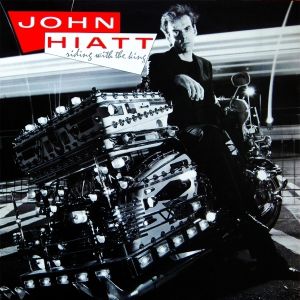
Riding with the King was singer-songwriter John Hiatt's sixth album, released in 1983. It was his second of three albums with Geffen Records. Ron Nagle and Scott Mathews produced side one of the album at The Pen in San Francisco, with Mathews himself playing all instruments and providing all the background vocals. The second side of the album was produced by Nick Lowe at Eden Studios in London with the musicians known as the Cowboy Outfit that Lowe recorded two albums with in the mid-1980s.
James Lloyd, better known by his stage name Lil' Cease, is an American rapper and former member of hip hop group Junior M.A.F.I.A.
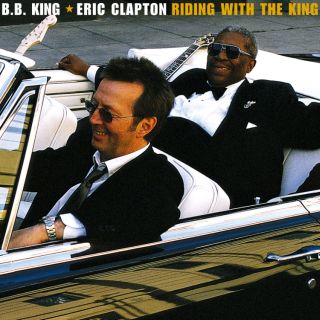
Riding with the King is a collaborative album by B.B. King and Eric Clapton that was released in 2000. It was their first collaborative album and won the 2001 Grammy Award for Best Traditional Blues Album. The album reached number one on Billboard's Top Blues Albums and was certified 2× Platinum in the United States. Riding with the King was also released on a DVD-Audio in higher resolution and with a 5.1 surround sound mix in 2000.

Simon Climie is an English singer-songwriter and producer. He is best known as the former lead singer of the UK duo Climie Fisher.
Philip Eugene Perry is an American R&B singer, songwriter, musician and a former member of the soul group, The Montclairs, from 1971 to 1975. He was also known for performing the opening song to Disney’s sitcom, Goof Troop.

"One Fine Day" is a song written by Gerry Goffin and Carole King. It first became a popular hit in the summer of 1963 for American girl group the Chiffons, who reached the top five on the Billboard Hot 100 chart. In 1980, King covered it herself and charted at No. 12 on the Hot 100 with her version, becoming her last top 40 hit. The song has subsequently been covered by numerous artists over the years.

B.B. King (1925–2015) was an American blues musician whose recording career spanned 1949–2008. As with other blues contemporaries, King's material was primarily released on singles until the late 1950s–early 1960s, when long playing record albums became more popular.
A Face in the Crowd may refer to:
King of the World may refer to:
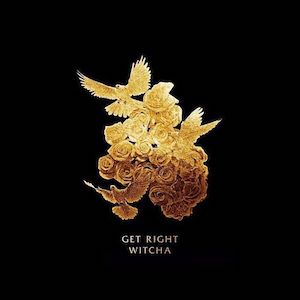
"Get Right Witcha" is a song by American hip hop group Migos from their second studio album Culture (2017) and was produced by Murda Beatz and Zaytoven.
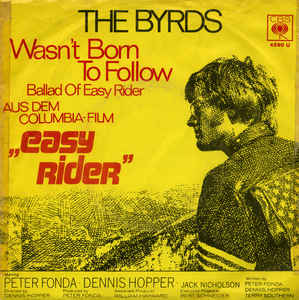
"Wasn't Born to Follow", also known as "I Wasn't Born to Follow", is a song written by Gerry Goffin and Carole King. Goffin wrote the lyrics and King provided the music. The song was first recorded by the Byrds on their 1968 album, The Notorious Byrd Brothers. King's short-lived band the City also recorded the song for their 1968 album, Now That Everything's Been Said. It has also been covered by many other artists, including the Monkees, the Lemon Pipers, Dusty Springfield, and as a solo recording by King. The Byrds recording was featured in the 1969 film Easy Rider and was released as a single in the UK and Germany in the same year as a result.
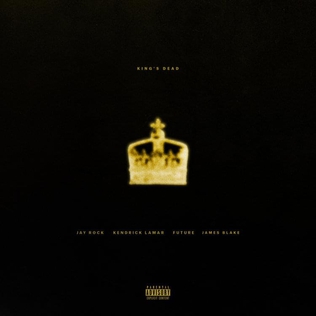
"King's Dead" is a song by American rappers Jay Rock, Kendrick Lamar, and Future with English singer James Blake, from the soundtrack album of the Marvel Studios superhero film Black Panther and Jay Rock's third studio album Redemption.

Freya Olivia Rose Ridings is an English singer, songwriter and multi-instrumentalist. Ridings rose to prominence in 2017 with her ballad, "Lost Without You", which became a top ten hit on the UK Singles Chart. She followed this with the release of her debut extended play, You Mean the World to Me (2019). Her self-titled debut album was supported by the single "Castles", which would become her international breakthrough.

"Ooh Poo Pah Doo" is a song written and performed by Jessie Hill. It was arranged and produced by Allen Toussaint. The single reached No. 3 on the Billboard R&B chart and No. 28 on the Hot 100 in 1960.